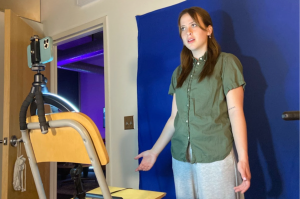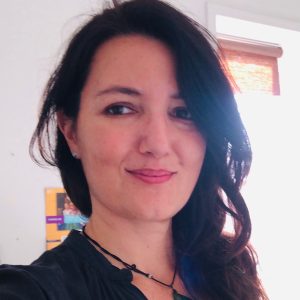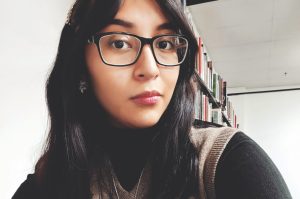Heidi Stevens, a columnist for the Chicago Tribune’s Life and Style section, embodies the meaning of “balancing act,” which also happens to be the title of her daily column. Stevens is a true Chicagoan whose writing style is as real as her genuine and humble personality. As a wife, mother and writer, Stevens shares her role in and out of context and how she views herself as a writer in an ever-evolving society.
Q: What made you choose journalism?
A: “I didn’t know what I wanted to do when I got to college. I wasn’t one of those freshmen who was like, ‘I know my major. I know my career path. Then freshman year one of my English professors said, ‘You’re a talented writer, you should think about writing as a career.’ I didn’t really know what that would look like. She suggested I go to the student newspaper and ask for an assignment, and I did and I was hooked almost immediately. I really loved the vibe of the newsroom. I loved how it was kind of a collection of misfits, and people who read a lot and were curious and talkative. By my senior year, I was the editor of the school paper. I interned at newspapers over the summers. I fell in love with it almost immediately.”
Q: What does a typical work day look like for you?
A: “Typical is a funny word because that implies that there is a typical day and they’re all slightly different. I usually start around 5 a.m. because my column is daily. I often write off the news just to be timely and to be relevant and be writing about what people are talking about that day. I poke around and see what’s trending, what people are talking about. I work until about 7 and then I stop and get my kids ready for school. I have two kids, second grade and fifth grade. Then I start back up around 8:45 and finish writing, file my column, answer any questions my editor has. I spend the rest of the day basically finding an audience for it–engaging with readers on social media–Facebook, Twitter, Google Plus, answering emails, and then looking for the next day’s column.”
Q: How has social media changed your career from when you started until now?
A: “Almost completely. When I started at the Tribune we didn’t have email, there was no website. It was 1998 we were literally drawing the newspaper [on] paper, with paper with pencils. . .we barely used computers. It’s evolved from the website being not much of a thought at all to the website being our whole mission, and social media to me is a way to send people to our website first and foremost. I don’t think my job wasn’t as much building my own brand and pushing my stories out to readers before social media. Social media has made part of my job become finding an audience and targeting an audience. I don’t think of that as a bad thing though, I enjoy engaging with readers and I enjoy the dialogue that we have on social media, but it’s changed my job probably more than just about anything.”
Q: How do you balance between being a mom and being a wife and working for the biggest newspaper in the city?
A: “It’s crazy. It’s total madness. I drink a lot of coffee. I don’t think of all of those things as separate parts of my life that I have to sort of stop and start. I try to just think of them all as one thing. I will bring my kids to work. I will bring my work home. I don’t think a person could really do this job that I do and keep it in silos. I write about my kids sometimes. I write about things I do with my kids. I sort of feel like I’m never not working. But I’m also never not a mom. I fit what I need to fit in, when I need to fit it in.”
Q: Your column is called Balancing Act, was that a name you chose or they chose for you?
A: “My first editor came up with that. When the column started, at the time I was a single mom of two, working full time, living in this little condo in the South Loop, kids in CPS, and that was not really a voice that the Tribune had. It was just a very personal slice of life column about work life balance, and divorce and remarriage and kids and raising kids in the city. Balancing act felt like a good name for that.
As the column grew and evolved into five days a week, I branched out. I don’t mostly write about myself anymore. Here and there I do for sure, but often it’s about current events, it’s about gender bias, it’s about body image, it’s about politics, it’s about a little bit of everything.
Q: Do you think there’s a part of your job that readers or audiences in general make assumptions about, but in reality it’s something totally different?
A: “I often wonder if people know that I’m getting the emails and comments they send. Sometimes the emails are either so mean or people said nice things and they’re so delighted when you email back. I do think that maybe people think that there’s sort of layers of walls that they have to go through before they actually reach us, and it’s like no, that email address down there really does email me and I really do see them all. People will often talk about my assistant and it’s hilarious because I am so far from having an assistant.”
Q: What is it that you enjoy most about your job?
A: “Getting to know people who I probably wouldn’t get to know if I didn’t have this job. That includes everyone from Judy Blume to a principal at a school on the South Side who I probably wouldn’t run into day to day. Just learning what makes people tick, and seeing all the good that people are doing in the world, and getting to write about that a little bit. It helps me have a more optimistic view of the world that I live in and that I’m raising children in.”

Q: What is your role in a city as large as Chicago, that has so many moving parts and is a mecca for diversity and politics?
A: “I was giving a talk a couple weeks ago at a luncheon, and a woman said, ‘What do you think your topic is, or your mission?’ I said, ‘I think I just want to make people feel less alone.’ I said, ‘I think you can feel alone without physically being alone.’ I think you can feel alone in an unhappy marriage. I think you can feel alone while you’re parenting. I think you can feel lonely at a job, or you don’t fit in. I just think a lot of us walk around feeling lonely, and I want what I write to make people feel like somebody’s in their corner and that they’re not alone.”
Q: What advice do you have to give to somebody like me who is aspiring to be in this world of Journalism?
A: “What I wish someone would have told me when I was 23 and just starting at the Tribune was that you belong here and that this place, this newspaper, and to a large extent this world that you’re covering needs you as much as you need it.
When I started here I had a major case of imposter syndrome. I didn’t feel like I belonged. I was surrounded by 49-year-old white men and I felt like an annoying little girl who didn’t know much. I wish that I knew then what I know now which is that we need people of every age and walk of life, and experience level, and socioeconomic background, and cultural background and worshiping background to evolve and to move forward, and do the best job we can do covering our city, and our state, and our nation and our world. A newspaper will never be any good if it’s only represented by one type of person. I would tell young journalists to remember that you belong in those newsrooms and that those newsrooms need you. They need your voice and they need the lens that you see the world through and that you’re going to make them better places.”











Be First to Comment